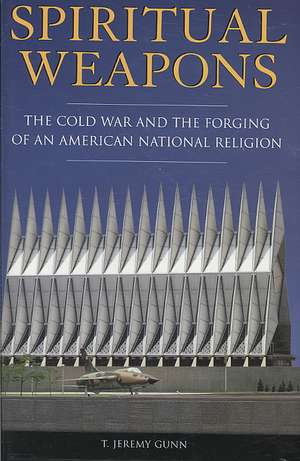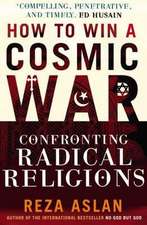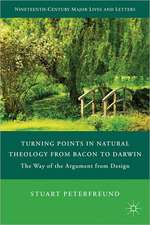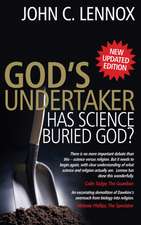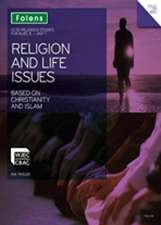Spiritual Weapons: The Cold War and the Forging of an American National Religion: Religion, Politics, and Public Life Under the auspices of the Leonard E. Greenb
Autor T. Jeremy Gunnen Limba Engleză Hardback – 29 dec 2008 – vârsta până la 17 ani
Preț: 324.87 lei
Preț vechi: 393.72 lei
-17% Nou
Puncte Express: 487
Preț estimativ în valută:
62.17€ • 66.47$ • 51.83£
62.17€ • 66.47$ • 51.83£
Carte tipărită la comandă
Livrare economică 18 aprilie-02 mai
Preluare comenzi: 021 569.72.76
Specificații
ISBN-13: 9780275985493
ISBN-10: 0275985490
Pagini: 312
Dimensiuni: 156 x 235 x 36 mm
Greutate: 0.66 kg
Editura: Bloomsbury Publishing
Colecția Praeger
Seria Religion, Politics, and Public Life Under the auspices of the Leonard E. Greenb
Locul publicării:New York, United States
ISBN-10: 0275985490
Pagini: 312
Dimensiuni: 156 x 235 x 36 mm
Greutate: 0.66 kg
Editura: Bloomsbury Publishing
Colecția Praeger
Seria Religion, Politics, and Public Life Under the auspices of the Leonard E. Greenb
Locul publicării:New York, United States
Notă biografică
T. Jeremy Gunn is Director, Program on Freedom of Religion and Belief of the American Civil Liberties Union, senior Fellow for Religion and Human Rights, Emory University School of Law, and Member of the Advisory Council on Freedom of Religion or Belief of the Organization for Security and Cooperation in Europe (OSCE). He is the author of A Standard for Repair: The Establishment Clause, Equality, and Natural Rights and other articles on religion, law, and history.
Cuprins
Chapter 1. Launching Spiritual WeaponsPART I. FoundationsChapter 2. Present at the Creation: The American National ReligionChapter 3. Enduring American ThemesPART II. An American National ReligionChapter 4. Governmental Theism: Religion as the First Line of DefenseChapter 5. A Military Second to NoneChapter 6. Capitalism as Freedom: The Baptism of Free EnterprisePART III. Deploying Americas Spiritual Weapons AbroadChapter 7. Guatemala: Coups and ConsequencesChapter 8. Religion and the Origins of American Involvement in VietnamChapter 9. Conclusion: The Lessons of HistoryAppendix I: President Harry Trumans 1951 SpeechAppendix II: Chronology of 1954 Coup in GuatemalaAppendix III: CIA Cable April 28, 1954 423
Recenzii
Gunn (religion and human rights, Emory U.) directs the program of freedom of religion and belief at the American Civil Liberties Union argues that after 1947, a new worldview emerged among Americans that was forged by the Cold War and rose in reaction to both the perceived and real dangers posed by the Soviet Union and communism. The pillars of this view were governmental theism, military supremacy, and capitalism as freedom.
This thoughtful exploration of religion's changing role in American foreign policy from the Cold War to Vietnam offers important discussions of that history's contemporary impact. Summing Up: Recommended. Upper-level undergraduates through faculty/researchers; general readers.
This thoughtful exploration of religion's changing role in American foreign policy from the Cold War to Vietnam offers important discussions of that history's contemporary impact. Summing Up: Recommended. Upper-level undergraduates through faculty/researchers; general readers.
